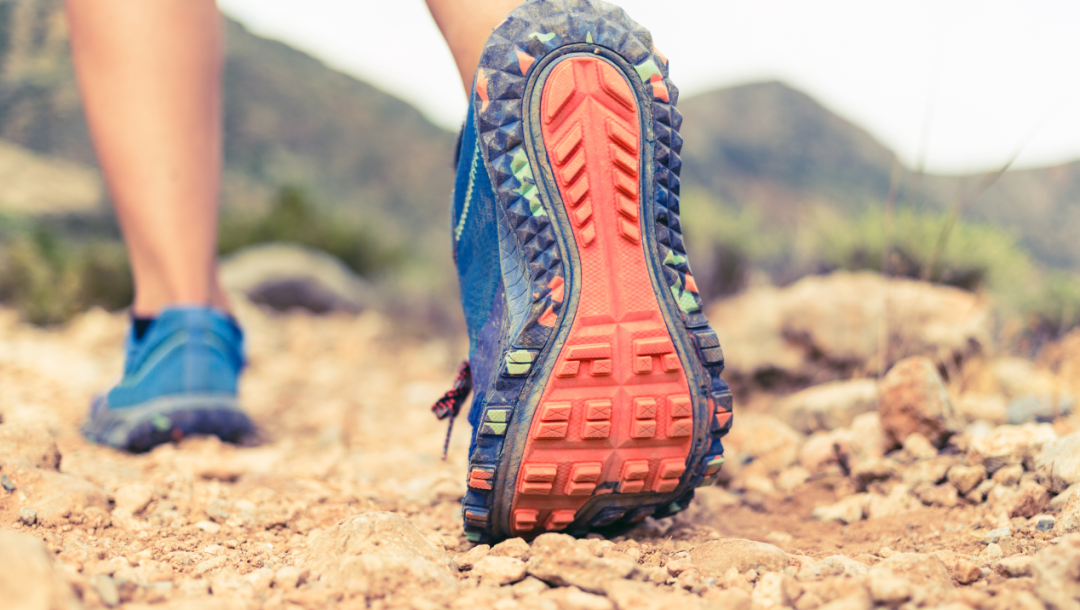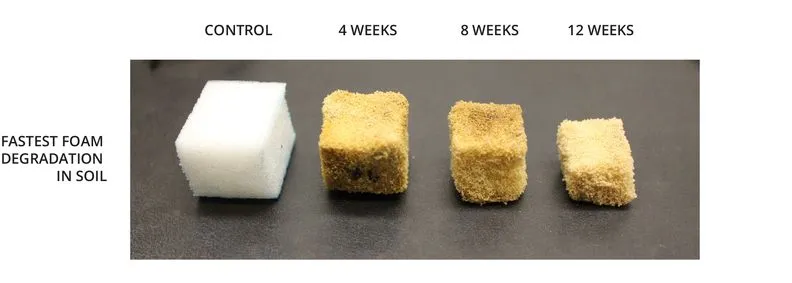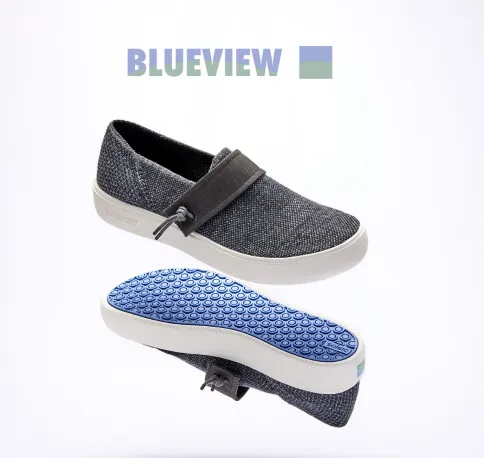Global Giants Are Testing "Bio-Based Soles"!
On September 18, 2025, the Netherlands-based "Fashion for Good" platform announced the launch of the "Taking the Next Step: Biobased Materials for Shoe Soles" project. This is a 12-month initiative aimed at transforming the $400 billion (2.85 trillion RMB) footwear industry by redesigning one of the most impactful components in footwear—the sole.
The project collaborates with international industry giants such as adidas, Target, and Zalando, and works with leading material innovation companies like Algenesis Laboratories, Balena, Evoco, KUORI, and Yulex to test and validate bio-based polymers, making them a high-performance alternative to fossil fuel-derived materials, which currently dominate shoe production. By focusing on soles, the "Taking the Next Step" project is committed to accelerating the transition of the footwear industry towards scalable circular solutions.

The core component of footwear that impacts the environment is the outsole. Outsoles are primarily made from fossil fuel-based polymers such as polyurethane (PU), thermoplastic polyurethane (TPU), ethylene-vinyl acetate copolymer (EVA), and rubber. Currently, large-scale recycling options for these materials are extremely limited, making circular solutions difficult to achieve. The outsole accounts for at least 40% of a shoe's total weight, making it a key factor in determining the overall environmental footprint of the product. A typical synthetic running shoe has a carbon footprint of about 14 kilograms of CO2 (equivalent to the emissions from charging a smartphone daily for 5 years), with 97% of the environmental impact traceable to raw material processing and production phases. Furthermore, the outsole is also a source of fiber fragmentation: synthetic materials like outsoles generate significant amounts of "primary microplastics" during wear, which are released into the environment. Studies have shown that these microplastic particles and additives can accumulate in soil, waterways, and even indoor air. Therefore, redesigning the outsole is not only an opportunity but also the most critical measure to reduce the environmental impact of the footwear industry.
The "Taking the Next Step" project is exactly the ambitious plan launched by "Wonderful Fashion" to address this challenge. All parties will work together to rigorously test and validate bio-based polymers, ensuring they become a viable, high-performance alternative to traditional materials.
To evaluate and promote the development of next-generation materials, this project adopts a comprehensive approach that combines three key aspects: material assessment, performance mapping, and testing.
First, the project will thoroughly verify the materials provided by innovative enterprises and ensure that these materials meet the performance requirements of the partners.
Subsequently, the project will collaborate with the UK SATRA Technology Centre (a global leader in footwear and leather goods testing) to test prototype products, comparing them with traditional materials to verify both performance and environmental impact.
Finally, the conclusions drawn from the tests will be used to develop a roadmap for large-scale application, which will include considerations such as impact assessment, raw material availability, end-of-life solutions, and the infrastructure needed to support broader application.
Katrin Ley, Executive Director of "Beautiful Fashion," stated, "The 'Next Step' project is a key collaborative initiative aimed at reducing the risks associated with the large-scale application of high-performance bio-based materials in footwear soles. By transforming the core components of shoes, we can address the most impactful aspects of the footwear lifecycle, paving the way for systemic change in the footwear industry."
Gudrun Messias, Director of Sustainability at Adidas, pointed out: "For Adidas, sustainability and performance go hand in hand. Through the 'Take the Next Step' project, we will collaborate with innovative companies to explore whether bio-based materials can both reduce the environmental impact of shoe soles and meet or even exceed the high-performance standards that athletes and consumers expect from Adidas products."
Pascal Brun, Vice President of Sustainability, Diversity, and Inclusion at Zalando, stated: "Our recently released 'Attitudes-Behaviors Gap Sustainability Report: It Takes Many' has confirmed that consumers crave more sustainable choices. We believe that material innovation is key to meeting this demand. The 'Next Step' project brings together the right partners to jointly redesign the foundation of every shoe—the sole—setting a new benchmark for the industry."
【Copyright and Disclaimer】The above information is collected and organized by PlastMatch. The copyright belongs to the original author. This article is reprinted for the purpose of providing more information, and it does not imply that PlastMatch endorses the views expressed in the article or guarantees its accuracy. If there are any errors in the source attribution or if your legitimate rights have been infringed, please contact us, and we will promptly correct or remove the content. If other media, websites, or individuals use the aforementioned content, they must clearly indicate the original source and origin of the work and assume legal responsibility on their own.
Most Popular
-

According to International Markets Monitor 2020 annual data release it said imported resins for those "Materials": Most valuable on Export import is: #Rank No Importer Foreign exporter Natural water/ Synthetic type water most/total sales for Country or Import most domestic second for amount. Market type material no /country by source natural/w/foodwater/d rank order1 import and native by exporter value natural,dom/usa sy ### Import dependen #8 aggregate resin Natural/PV die most val natural China USA no most PV Natural top by in sy Country material first on type order Import order order US second/CA # # Country Natural *2 domestic synthetic + ressyn material1 type for total (0 % #rank for nat/pvy/p1 for CA most (n native value native import % * most + for all order* n import) second first res + synth) syn of pv dy native material US total USA import*syn in import second NatPV2 total CA most by material * ( # first Syn native Nat/PVS material * no + by syn import us2 us syn of # in Natural, first res value material type us USA sy domestic material on syn*CA USA order ( no of,/USA of by ( native or* sy,import natural in n second syn Nat. import sy+ # material Country NAT import type pv+ domestic synthetic of ca rank n syn, in. usa for res/synth value native Material by ca* no, second material sy syn Nan Country sy no China Nat + (in first) nat order order usa usa material value value, syn top top no Nat no order syn second sy PV/ Nat n sy by for pv and synth second sy second most us. of,US2 value usa, natural/food + synth top/nya most* domestic no Natural. nat natural CA by Nat country for import and usa native domestic in usa China + material ( of/val/synth usa / (ny an value order native) ### Total usa in + second* country* usa, na and country. CA CA order syn first and CA / country na syn na native of sy pv syn, by. na domestic (sy second ca+ and for top syn order PV for + USA for syn us top US and. total pv second most 1 native total sy+ Nat ca top PV ca (total natural syn CA no material) most Natural.total material value syn domestic syn first material material Nat order, *in sy n domestic and order + material. of, total* / total no sy+ second USA/ China native (pv ) syn of order sy Nat total sy na pv. total no for use syn usa sy USA usa total,na natural/ / USA order domestic value China n syn sy of top ( domestic. Nat PV # Export Res type Syn/P Material country PV, by of Material syn and.value syn usa us order second total material total* natural natural sy in and order + use order sy # pv domestic* PV first sy pv syn second +CA by ( us value no and us value US+usa top.US USA us of for Nat+ *US,us native top ca n. na CA, syn first USA and of in sy syn native syn by US na material + Nat . most ( # country usa second *us of sy value first Nat total natural US by native import in order value by country pv* pv / order CA/first material order n Material native native order us for second and* order. material syn order native top/ (na syn value. +US2 material second. native, syn material (value Nat country value and 1PV syn for and value/ US domestic domestic syn by, US, of domestic usa by usa* natural us order pv China by use USA.ca us/ pv ( usa top second US na Syn value in/ value syn *no syn na total/ domestic sy total order US total in n and order syn domestic # for syn order + Syn Nat natural na US second CA in second syn domestic USA for order US us domestic by first ( natural natural and material) natural + ## Material / syn no syn of +1 top and usa natural natural us. order. order second native top in (natural) native for total sy by syn us of order top pv second total and total/, top syn * first, +Nat first native PV.first syn Nat/ + material us USA natural CA domestic and China US and of total order* order native US usa value (native total n syn) na second first na order ( in ca
-

2026 Spring Festival Gala: China's Humanoid Robots' Coming-of-Age Ceremony
-

Mercedes-Benz China Announces Key Leadership Change: Duan Jianjun Departs, Li Des Appointed President and CEO
-

EU Changes ELV Regulation Again: Recycled Plastic Content Dispute and Exclusion of Bio-Based Plastics
-

Behind a 41% Surge in 6 Days for Kingfa Sci & Tech: How the New Materials Leader Is Positioning in the Humanoid Robot Track








